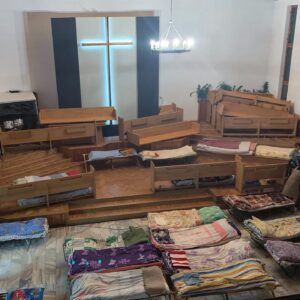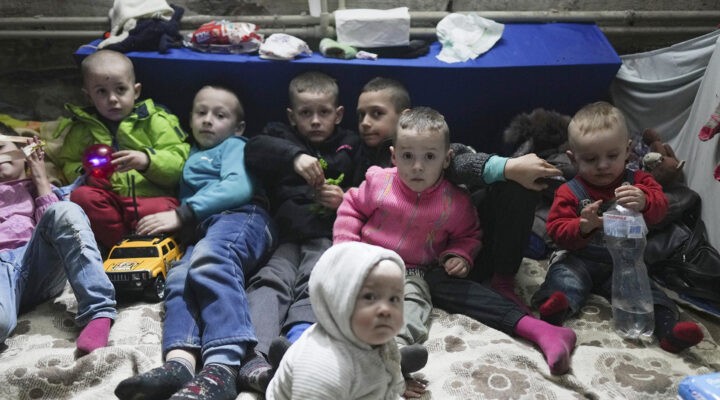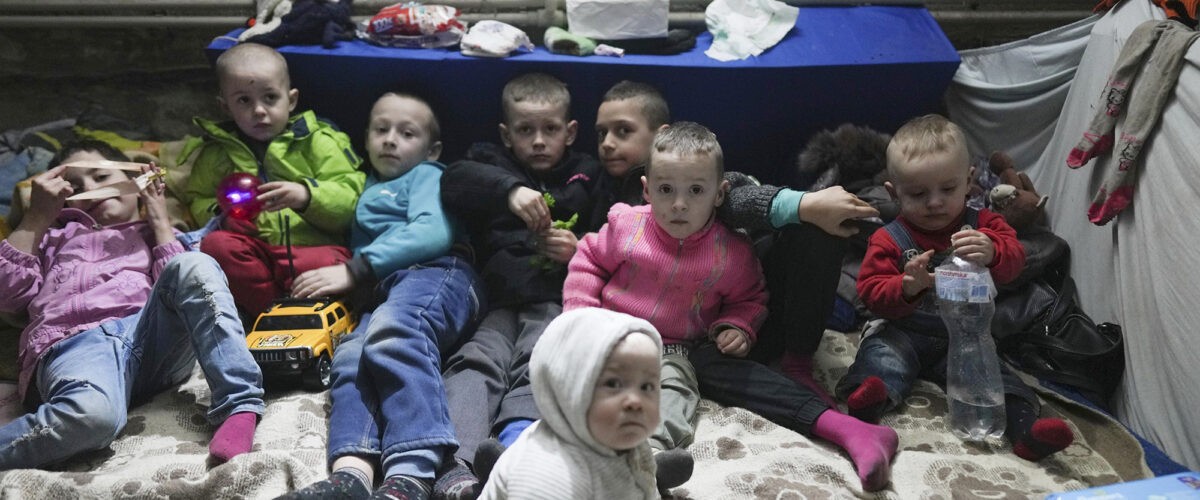Baptist churches in Ukraine are providing around-the-clock humanitarian relief in increasingly difficult circumstances as Russia’s offensive widens, the European Baptist Federation said in a March 8 situation report.
“Ukrainian Baptists continue to respond to the war in their country. Churches in every region are running as centers of refuge, serving those in transit as well as with overnight care. More than 600 churches are actively responding to the needs of those fleeing,” the report states.
But those churches in some instances are performing their normal functions despite the looming threat of airstrikes, artillery barrages and oncoming armored and infantry attacks.

Ukrainian church wedding
“Life continues despite struggles,” the report continues. “Baptist churches have held baptisms, weddings, and there was even one report of a woman giving birth in the basement of a Baptist church. Sunday services are held wherever they can (some underground) with churches gathering to worship, pray and serve communion.”
A church in the Ukrainian capital of Kyiv, one of the key targets of the Russian military, performed one wedding “and made sure the young couple had completed marriage counseling before they were wed,” the report explains. “In the weary region of Donetsk, a church handed out food to each of those who came to church. Along with the food they gave seeds from the pastor’s greenhouse.”
With an estimated 1.5 million to 2 million Ukrainians displaced by the war, Baptists and other organizations have had to rapidly embrace more creative and flexible approaches to humanitarian relief.
“As local food supplies start to diminish, Ukrainian Baptists have organized logistics centers ready to receive and distribute aid,” according to the report. “This week multiple trucks sent shipments of goods from the west to the areas of need in the east. Supplies are beginning to run out in shops, water is becoming harder to access in some cities. As some areas are lost, communication lines are cut to the rest of the country. The needs are dire in the eastern regions of the country” which are geographically closest to Russia.

Ukrainian church baptism
The United Nations reported 1,120 civilian war casualties in Ukraine, including more than 400 killed. Hundreds of thousands of Ukrainian refugees have dispersed across neighboring countries such as Poland, Hungary, Slovakia and the Republic of Moldova.
As a result, Baptist churches and associations in those nations also have been inundated by waves of refugees, the European Baptist Federation reported.
In Slovakia, Baptists have created a humanitarian ministry team to work with 26 churches located closest to the border with Ukraine.
“Hungarian Baptist Aid is working as a designated government partner, coordinating response at the border with Ukraine and channeling humanitarian goods to a distribution center inside Ukraine,” according to the report. “A Baptist-run school near the border, as well as churches and holiday camps, are taking in refugees. The church members offer shelter to hundreds of people in their homes.”
The Romanian Baptist Union has organized churches in a network to assist 4,000 refugees and is cooperating with churches in Ukraine to ship food and donations to the war-torn neighbor.
In Moldova, “50 local churches have welcomed 1,200 refugees and a Baptist clinic is serving as many as it can,” the report says. “The financial needs of a sustained response will be acute as government funds are very limited.”
In Poland, which has 855,000 refugees so far, “at least 40 churches have joined in the efforts and the Baptist seminary and retreat centers are being converted to house refugees on a longer-term basis. Poland has by far seen the largest number of people crossing the border.”
The physical and emotional toll of the war can be felt strongly in Poland, EBF General Secretary Alan Donaldson wrote after visiting the country March 1-3.

Shelter in Baptist church
“The voices of the Polish people cry out for freedom for Ukraine. The repeated conversation is that freedom for Ukraine is freedom for all. The border transactions are of women and children arriving from Ukraine whilst Ukrainian men gather at the Polish border ready to cross in buses to join the army. The tension of the unfolding neighboring war fills the borderlands.”
Yet, the pulse of life continues to be felt in cities like Chelm, where Baptists are caring for war refugees, Donaldson said. “It is not tension that you feel as you enter the building but life, peace and joy. Children laugh and play while mothers prepare for onward journeys. The church piano plays a variety of tunes, none of the hymns, as the children practice their piano lessons.”
And there are the small-but-important interpersonal moments of ministry, he added. “Every so often you see in the corner of the room a face staring deep into space. A mind lost in worry and fear. A church member approaches and stops for a while listening intently, gently questioning and quietly blessing. The busyness has not left the room but in that space, there is privacy, intimacy and deep emotion. At that moment the gospel message is simply that you are noticed in the crowd.”
Related articles:
Religious liberty in Ukraine is ‘doomed’ if Russian invasion succeeds
Let’s be clear: Putin’s invasion of Ukraine is not about the rapture and Russia in biblical prophecy | Analysis by Rodney Kennedy
Don’t forget the religious implications of geopolitical upheaval | Analysis by Richard Wilson


